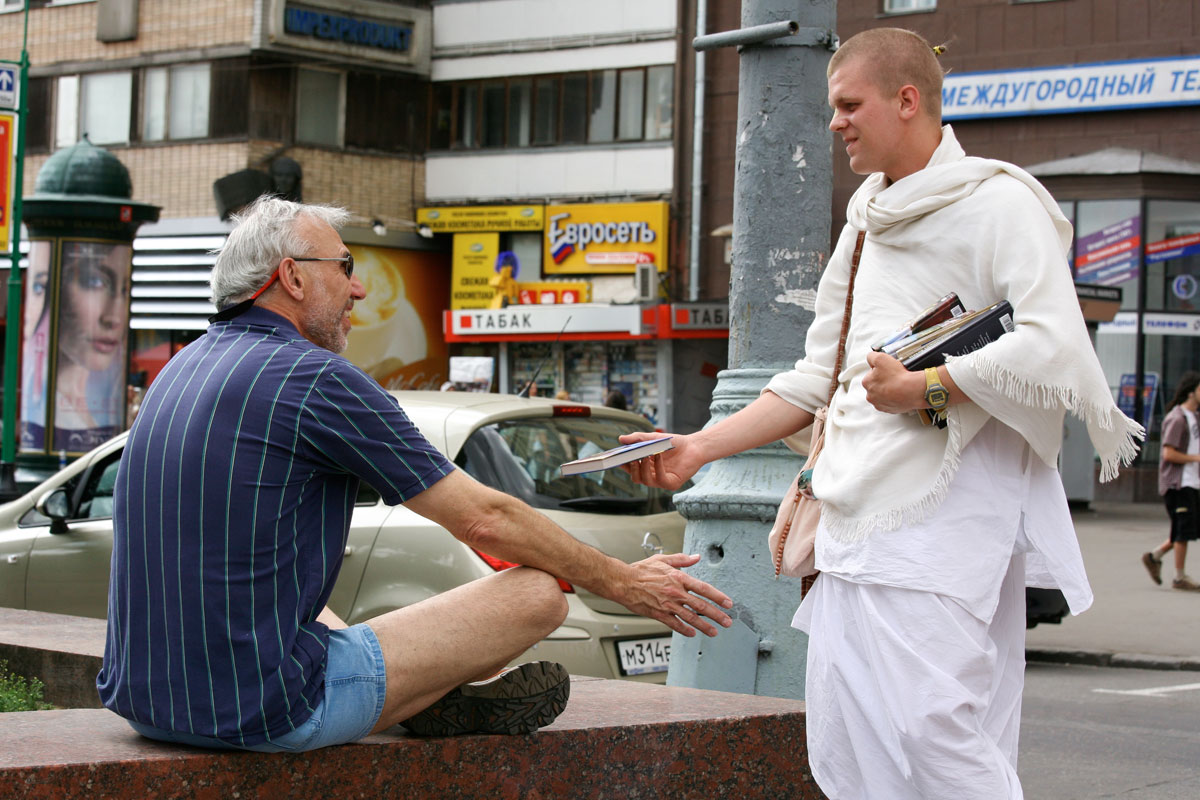
New religious movement
A new religious movement (NRM), also known as alternative spirituality or a new religion, is a religious or spiritual group that has modern origins and is peripheral to its society's dominant religious culture. NRMs can be novel in origin or they can be part of a wider religion, in which case they are distinct from pre-existing denominations. Some NRMs deal with the challenges that the modernizing world poses to them by embracing individualism, while other NRMs deal with them by embracing tightly knit collective means.[1] Scholars have estimated that NRMs number in the tens of thousands worldwide. Most NRMs only have a few members, some of them have thousands of members, and a few of them have more than a million members.[2]
"New religion" redirects here. For other uses, see New religion (disambiguation).
There is no single, agreed-upon criterion for defining a "new religious movement".[3] There is debate as to how the term "new" should be interpreted in this context.[4] One perspective is that it should designate a religion that is more recent in its origins than large, well-established religions like Hinduism, Judaism, Buddhism, Christianity, and Islam.[4] Some scholars view the 1950s or the end of the Second World War in 1945 as the defining time,[5] while others look as far back as the founding of the Latter Day Saint movement in 1830[4][6] and of Tenrikyo in 1838.[7][8]
New religions have sometimes faced opposition from established religious organisations and secular institutions. In Western nations, a secular anti-cult movement and a Christian countercult movement emerged during the 1970s and 1980s to oppose emergent groups.
In the 1970s, a distinct field of new religion studies developed within the academic study of religion. There are several scholarly organisations and peer-reviewed journals devoted to the subject. Religious studies scholars contextualize the rise of NRMs in modernity as a product of, and answer to modern processes of secularization, globalization, detraditionalization, fragmentation, reflexivity, and individualization.[1]
Membership[edit]
Demographics[edit]
NRMs typically consist largely of first-generation believers,[58] and thus often have a younger average membership than mainstream religious congregations.[59] Some NRMs have been formed by groups who have split from a pre-existing religious group.[49] As these members grow older, many have children who are then brought up within the NRM.[60]
In the Third World, NRMs most often appeal to the poor and oppressed sectors of society.[61] Within Western countries, they are more likely to appeal to members of the middle and upper-middle classes,[61] with Barrett stating that new religions in the UK and US largely attract "white, middle-class late teens and twenties".[62] There are exceptions, such as the Rastafari movement and the Nation of Islam, which have primarily attracted Black members.[61]
A popular conception, unsupported by evidence, holds that those who convert to new religions are either mentally ill or become so through their involvement with them.[63] Dick Anthony, a forensic psychologist noted for his writings on the brainwashing controversy,[64][65] has defended NRMs, and in 1988 argued that involvement in such movements may often be beneficial: "There's a large research literature published in mainstream journals on the mental health effects of new religions. For the most part, the effects seem to be positive in any way that's measurable."[66]
Joining[edit]
Those who convert to a NRM typically believe that in doing so they are gaining some benefit in their life. This can come in many forms, from an increasing sense of freedom to a release from drug dependency, and a feeling of self-respect and direction. Many of those who have left NRMs report that they have gained from their experience. There are various reasons as to why an individual would join and then remain part of a NRM, including both push and pull factors.[67] According to Marc Galanter, professor of psychiatry at NYU,[68] typical reasons why people join NRMs include a search for community and a spiritual quest. Sociologists Stark and Bainbridge, in discussing the process by which people join new religious groups, have questioned the utility of the concept of conversion, suggesting that affiliation is a more useful concept.[69]
A popular explanation for why people join new religious movements is that they have been "brainwashed" or subject to "mind control" by the NRM itself.[70] This explanation provides a rationale for "deprogramming", a process in which members of NRMs are illegally kidnapped by individuals who then attempt to convince them to reject their beliefs.[70] Professional deprogrammers, therefore, have a financial interest in promoting the "brainwashing" explanation.[71] Academic research, however, has demonstrated that these brainwashing techniques "simply do not exist".[72]
Leaving[edit]
Many members of NRMs leave these groups of their own free will.[73] Some of those who do so retain friends within the movement.[74] Some of those who leave a religious community are unhappy with the time that they spent as part of it.[74] Leaving a NRM can pose a number of difficulties.[75] It may result in their having to abandon a daily framework that they had previously adhered to.[76] It may also generate mixed emotions as ex-members lose the feelings of absolute certainty, which they may have held while in the group.[75]